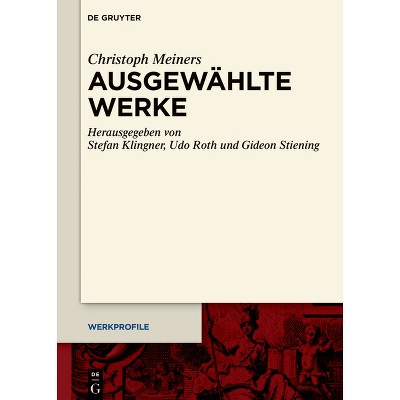Sponsored

Intertextual Exoticism - (New Directions in German Studies) by Richard Sperber (Hardcover)
$130.99
In Stock
Eligible for registries and wish lists
Sponsored
About this item
Highlights
- Intertextual Exoticism reads a body of non-canonical German exoticist literature published after imperial Germany's loss of colonial Oceania in 1914, applying theories of "intertextuality" (Kristeva) and recent scholarship on literary exoticism to explore Germany's postwar crises of psychology, masculinity, and national identity mapped onto Oceanic spaces.Many readers are familiar with late Victorian texts expressing imperial Britain's anxieties.
- About the Author: Richard Sperber is Associate Professor of German and Spanish at Carthage College, USA.
- 376 Pages
- Literary Criticism, European
- Series Name: New Directions in German Studies
Description
About the Book
Examines how Imperial Germany's loss of Oceania after the First World War and its post-war crises of national identity played out in a body of German exoticist literature about Oceania published after 1914.Book Synopsis
Intertextual Exoticism reads a body of non-canonical German exoticist literature published after imperial Germany's loss of colonial Oceania in 1914, applying theories of "intertextuality" (Kristeva) and recent scholarship on literary exoticism to explore Germany's postwar crises of psychology, masculinity, and national identity mapped onto Oceanic spaces.Many readers are familiar with late Victorian texts expressing imperial Britain's anxieties. Richard Sperber expands the scope of these texts in the context of a post-imperial Europe, examining how German exoticist literature, published after German colonial loss in Oceania in 1914, intensifies the gothic themes and subjectivities of these Victorian texts.
The first part of this volume examines eight adventure narratives of Oceania, demonstrating how they do not necessarily present or represent a single, unified German colonial project. They take place on islands owned by Australia and Britain, and the unprepared German protagonists-amateur naturalists and bungling traders-are compared unfavourably to resolute Anglophone adventurers. The second part then pairs five well-known exoticist texts, including Conrad's Heart of Darkness, Stevenson's The Beach of Falesá, Haggard's She, Hitchens' The Garden of Allah, and Wilde's Salomé, with five non-canonical exoticist German texts. Sperber shows through these pairings how German literary exoticism becomes a transnational and intertextual literature that rereads dominant themes in 20th-century Europe's greater literatures of exoticism and colonial loss.
About the Author
Richard Sperber is Associate Professor of German and Spanish at Carthage College, USA. He is the author of The Discourse of Flanerie in Antonio Muñoz Molina's Texts (2015).Dimensions (Overall): 8.5 Inches (H) x 5.5 Inches (W) x .88 Inches (D)
Weight: 1.28 Pounds
Suggested Age: 22 Years and Up
Number of Pages: 376
Genre: Literary Criticism
Sub-Genre: European
Series Title: New Directions in German Studies
Publisher: Bloomsbury Academic
Theme: German
Format: Hardcover
Author: Richard Sperber
Language: English
Street Date: April 24, 2025
TCIN: 1004182450
UPC: 9798765135525
Item Number (DPCI): 247-02-4309
Origin: Made in the USA or Imported
If the item details aren’t accurate or complete, we want to know about it.
Shipping details
Estimated ship dimensions: 0.88 inches length x 5.5 inches width x 8.5 inches height
Estimated ship weight: 1.28 pounds
We regret that this item cannot be shipped to PO Boxes.
This item cannot be shipped to the following locations: American Samoa (see also separate entry under AS), Guam (see also separate entry under GU), Northern Mariana Islands, Puerto Rico (see also separate entry under PR), United States Minor Outlying Islands, Virgin Islands, U.S., APO/FPO
Return details
This item can be returned to any Target store or Target.com.
This item must be returned within 90 days of the date it was purchased in store, shipped, delivered by a Shipt shopper, or made ready for pickup.
See the return policy for complete information.











